
Faith Nyasuguta
Zimbabwe, Africa’s largest producer of lithium, is taking another bold step to keep more profits from its mineral wealth at home. Starting January 2027, the country will ban the export of lithium concentrates, a move designed to promote local processing and strengthen its presence in the global battery supply chain.
The announcement was made by Mines Minister Winston Chitando on Tuesday during a press briefing in Harare. “With effect from January 2027, the export of lithium concentrates will no longer be allowed,” Chitando said, emphasizing the government’s commitment to boosting value addition within Zimbabwe’s borders.
This decision builds on a 2022 ban on raw lithium ore exports, reflecting a broader strategy to prevent foreign firms from shipping out unprocessed minerals. For years, companies, mostly Chinese, have exported lithium concentrates from Zimbabwe to China for processing. That’s about to change.

Currently, two lithium sulphate processing plants are being developed to support this transition. One is located at Bikita Minerals, run by China’s Sinomine Resource Group, and the other at Prospect Lithium Zimbabwe, owned by Zhejiang Huayou Cobalt. Lithium sulphate is a key intermediate material used to produce lithium carbonate and lithium hydroxide- essential ingredients for electric vehicle batteries and renewable energy storage.
“Because of that capacity which is now in the country, the export of all lithium concentrates will be banned from January 2027,” Chitando said.
The move signals Zimbabwe’s growing role in the global lithium supply chain, despite a recent dip in prices. After a spike in 2021 and 2022, lithium prices have dropped by nearly 90% due to oversupply and slowing electric vehicle demand. Still, Chinese companies continue to pour investments into Zimbabwe to secure future supply.
Last year alone, Zimbabwe accounted for around 14% of China’s lithium imports, according to data from CRU Group. Companies like Sinomine, Huayou Cobalt, Chengxin Lithium Group, Yahua Group, and Canmax Technologies have invested over $1 billion in Zimbabwe’s lithium sector since 2021.

While Zimbabwe leads the way, other African nations such as Namibia, Mali, Ghana, and the Democratic Republic of Congo are also exploring lithium opportunities. However, their projects are still in the early stages compared to developments across the Americas, Europe, and Australia.
For Zimbabwe, the 2027 export ban is not just a regulatory measure, it’s a clear signal that the country wants more than just to extract minerals. It wants to build industries, create jobs, and play a strategic role in the energy transition.
RELATED:








